What is a TFCC Tear Injury in Your Wrist?

The Triangular FibroCartilage Complex (TFCC) plays a vital role in the intricate mechanics and stability of the wrist joint. Positioned in the lower region of the wrist, the TFCC serves as a crucial support structure connecting the end of the ulna, one of the two forearm bones, to the small bones in the wrist.
The TFCC consists of a complex network of ligaments, tendons, and cartilage, forming a triangular-shaped structure that spans the ulnar side of the wrist joint. Its primary function is to provide stability, cushioning, and load distribution to the ulnar side of the wrist, allowing for smooth movement and coordination between the forearm and the wrist.
Individual anatomical variations can contribute to differing susceptibilities to TFCC injuries. One such variation involves the relative lengths of the forearm bones. In individuals with a longer ulna compared to their radius, the TFCC is typically thinner and more vulnerable to tears and damage. This anatomical discrepancy, known as ulnar-positive variance, can increase the risk of TFCC injuries and affect the overall stability of the wrist joint.
When the TFCC becomes compromised due to injury or degeneration, it can lead to a range of symptoms and functional limitations. Tears or damage to the TFCC can cause pain, instability, swelling, and limited range of motion in the affected wrist. Activities that involve gripping, rotating the wrist, or putting weight on the hand may exacerbate these symptoms.
What are the Causes of TFCC Tears in the Wrist?
Injuries and tears in the TFCC can happen due to trauma, fractures, falls, or overuse and cause pain, swelling and limited range of motion. Twisting and repetitive motions can cause wear and tear to tissues that make up the TFCC. Degeneration of the TFCC happens more as we age which makes the TFCC thinner and more vulnerable to tears and injuries.
What are the Symptoms of Triangular Fibrocartilage Complex Tears?

– Clicks or pops when rotating your wrist or forearm
– Difficulty rotating your wrist
– Pain on the ulnar side of your wrist
– Reduction in your ability to grip objects tightly
– Weakness in your wrist
These symptoms may be worse during certain activities that involve the use of the wrist and hand.
How to Tell the Difference Between a Wrist Sprain and a TFCC Tear?
Your physician can order imaging tests like X-rays or an MRI to determine your diagnosis and if a Triangular FibroCartilage Complex injury is what is causing your wrist pain.
Wrist sprains happen when the ligaments in your wrist are stretched or torn which causes pain, inflammation, swelling, tenderness and limited mobility.
TFCC injuries are a kind of wrist sprain that occurs when cartilage, ligaments, and small bones in the wrist joint are damaged. TFCC injury causes pain on the outer part of the wrist and sometimes clicks and pops when rotating it.
What are Common Treatments for Triangular Fibrocartilage Complex Tears?
Minor TFCC tears sometimes heal without treatment but some tears and injuries may interfere with your ability to perform daily tasks. Braces, medication, injections, or physical therapy may offer relief so you can heal. You may be wondering if a TFCC injury can heal without surgery? With the proper rest and support, your TFCC can likely heal but sometimes minimally-invasive surgery is recommended in severe cases.
How can the FICOR Fit Wristband Help Relieve Pain From TFCC Injuries?
Our FICOR Fit bands, will help relieve TFCC wrist pain from tears and injuries by immobilizing and supporting your wrist. When you wear our FICOR Fit band it keeps the wrist in a neutral position and helps to reduce the force that may be exerted on the ulnar side of the wrist where the TFCC is located. This helps to eliminate the pain, inflammation, and pressure of the TFCC injury. Compression from the wristband increases blood flow to the area, and reduces swelling while also promoting healing.
What Makes the FICOR Fit Wristband Better for TFCC Injuries Than a Traditional Wrist Brace?
At FICOR, we take wrist support seriously. Our FICOR Fit wristband is designed to provide unsurpassed stability and comfort. With its adjustable strap, you can enjoy a personalized fit that enhances your healing process. The breathable design ensures great circulation, keeping your wrist cool and comfortable as you move. The simplicity of your FICOR Fit wristband makes it easy to use and its modern design makes it blend in with your lifestyle. Before you know it, you’ll be stronger and more mobile than ever before.
Remember, FICOR FIT Wristbands are preventative too, wearing it will lessens your chances of getting injured!!!!

